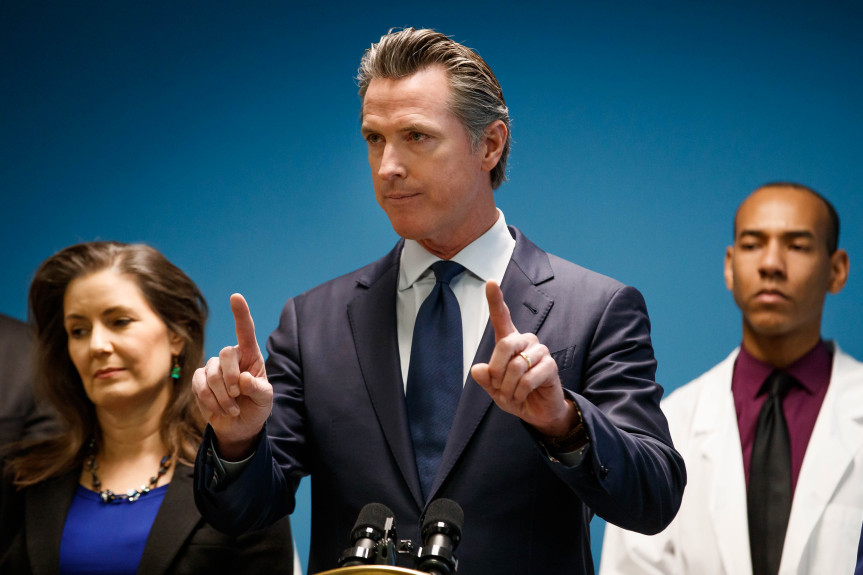Marking the most sweeping measure taken by a state to slow the spread of the COVID-19 disease, Gov. Gavin Newsom on Thursday ordered all of the state’s 40 million residents to stay at home with exceptions for essential work, food or other needs.
Newsom’s order, which does not have a defined end date, mirrors the country’s first regional shelter-in-place mandate instituted just days ago by seven Bay Area counties — Alameda, Contra Costa, Marin, Santa Clara, San Francisco, San Mateo and Santa Cruz.
“This is not a permanent state. This is a moment in time,” Newsom said during a news conference Thursday night. “If we’re to be criticized at this moment, let us be criticized for taking this moment seriously. Let us be criticized for going full force and meeting this virus head-on.”
Under the new statewide mandate, businesses that do not provide “essential services” are required to close. Those allowed to continue operation include grocery stores, health care facilities, pharmacies, gas stations, convenience stores, banks and laundromats, according to a Q&A on the governor’s website. Restaurants are permitted to stay open, but only for delivery and takeout service, the site states.
It exempts people who work in 16 federal critical infrastructure sectors, including health care, food and agriculture, financial services, emergency operations and transportation.
Nonessential gatherings of any number of people are banned. Residents are also limited to leaving their homes only for “essential” reasons, such as to obtain medications, shop for groceries and supplies, care for family members and exercise outdoors.
“We’re going to keep the grocery stores open,” Newsom said. “We’re going to make sure that you’re getting critical medical supplies. You can still take your kids outside, practicing common sense and social distancing. You can still walk your dog.”
As for enforcement of the statewide order, Newsom said there will be “a social contract” where everyone will be asked to help hold one another accountable for maintaining distance and adhering to the rules. “People will self-regulate their behavior and begin to adjust and adapt as they have been quite significant,” he said.
By Thursday, the number of confirmed coronavirus cases in California totaled more than 800, rising 21% overnight, the governor said, and the state’s coronavirus-related deaths had reached 16. As of Wednesday evening, about 17,000 tests had been conducted within California, according to the state, with 10,000 results still pending.
Santa Clara County — the hardest-hit in the state — recorded 14 new cases Thursday, for a total of 189, including six deaths.
San Jose Mayor Sam Liccardo voiced his strong support for expanding the mandate statewide.
“As the chair of the Big City Mayors, my colleagues and I have actively advocated for the State of California to take aggressive measures to combat the spread of COVID-19,” Liccardo said in a statement. “We appreciate that the Governor must take decisive action to mitigate the harm that will be wrought by this pandemic.”
The Santa Clara County Public Health Department also lauded the order.
“As the novel coronavirus continues to spread in our community and statewide, it is critical that all residents follow the direction of public health leaders to stay home except when necessary,” the department said in a statement. “Limiting interpersonal interactions is a proven strategy to protect the most vulnerable members of our community and slow the spread of the virus.”
The governor’s announcement came the same day that he provided a grim projection that 56% of Californians — 25.5 million people — could be infected with coronavirus in eight weeks if no efforts are made to control the spread of the disease.
“It is time for all of us to recognize we need to do more to meet this moment,” said Newsom, who has also asked the federal government for more than $1 billion to help California fight the outbreak.
Newsom acknowledged in an address that his projections assume the state makes no efforts to control the spread of the disease, when in fact his new stay-at-home order includes significant actions, such as banning assemblies and closing many businesses, that he predicted will “bend the curve.” Experts said the projection outlines a worst-case scenario.
During the news conference Thursday night, Newsom also unveiled some efforts to stabilize and expand hospital capacity during the crisis, including acquiring two hospital facilities with a total of 750 beds.
Newsom said the state had secured Seton Medical Center in Daly City — a 357-bed facility threatened with closure by the bankruptcy of its owner — and a hospital in Southern California that will be announced Friday. He also raised the possibility of using college dorm rooms, many of which have been emptied by shelter-in-place orders, for coronavirus patients.
About a week ago, the San Mateo County Board of Supervisors voted to spend $20 million — $5 million a year over the next four years — to help a buyer acquire and operate Seton hospitals. It is unclear with the state’s acquisition of the center where that devoted county funding stands.
Newsom said the state is also working to increase its supply of ventilators. The devices, which can cost as much as $50,000, are critical to the care of those gravely ill with the virus.
“We’re going to need to increase the manufacturing of those ventilators and we are working with the private sector and well-known entrepreneurs,” Newsom said in an apparent reference to Tesla co-founder Elon Musk, who said in a tweet Wednesday he would manufacture the machines if there is a shortage.

